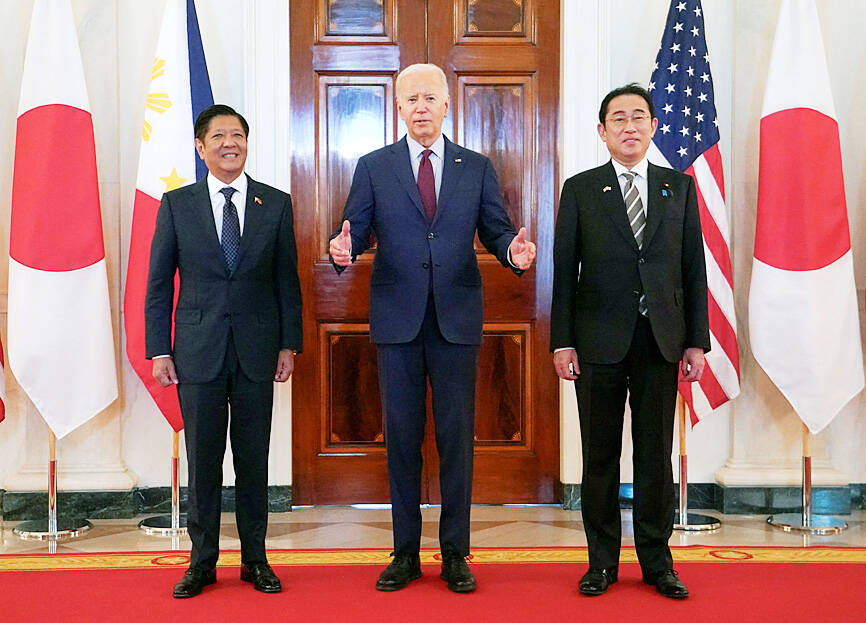US President Joe Biden, Japanese Prime Minister Fumio Kishida and Philippine President Ferdinand Marcos Jr on Thursday reiterated the importance of cross-strait peace and stability during their first-ever trilateral summit at the White House in Washington.
“We affirm the importance of peace and stability across the Taiwan Strait as an indispensable element of global security and prosperity, recognize that there is no change in our basic positions on Taiwan, and call for a peaceful resolution of cross-Strait issues,” the leaders said in a joint statement.
Taiwan welcomes the statement of concern and steadfast support for peace and stability across the Strait from the heads of state of the US, Japan and the Philippines, Presidential Office spokesperson Olivia Lin (林聿禪) said in Taipei.

Photo: Reuters
The joint statement showed that an international consensus has formed on protecting peace amid expanding authoritarianism that threatens global security and order, she said.
Taiwan will continue to build up its self-defense capabilities and cooperate with like-minded countries to safeguard the rules-based international order and contribute to global peace, stability and prosperity, Lin said.
The Ministry of Foreign Affairs added that Taiwan is a responsible international actor willing to collaborate with the three nations on maintaining peace, stability and prosperity across the Indo-Pacific region.
The trilateral summit cemented the US-Japan-Philippines joint security mechanism, which forms part of a larger defense network against China, Su Tzu-yun (蘇紫雲), a research fellow at the Taipei- based Institute for National Defense and Security Research, told a forum in Taipei.
He cited discussions between Biden and Kishida on what is being called the greatest upgrade to the Treaty of Mutual Cooperation and Security between the US and Japan since 1960, which would see the two countries engage in more coordinated command between US forces stationed in Japan and the Japan Self-Defense Forces.
This security network can operate in tandem with existing US-UK-Australia and US-Japan-South Korea security mechanisms to form a comprehensive regional security network against China, Su said.
Liao Hsiao-chuan (廖小娟), an associate professor of political science at National Taiwan University, said the trilateral summit marked Japan’s ascent from a regional ally to a global partner of the US’ global security strategy.
The summit also hinted at a potential growth of the US-led security framework in the region, as a strengthened Japan might provide a much-needed counterweight to China and North Korea should the US become isolationist by electing Donald Trump as president, she said.
The alliance between the US, Japan and the Philippines would be strong because of their shared interests in democratic values and the freedom of navigation in the region, said Hsiao Hsiu-an (蕭琇安), an associate research fellow at National Chengchi University’s Institute of International Relations.
However, Institute for National Policy Research senior adviser Lo Chih-cheng (羅致政) said that the US’ efforts to shore up the Indo-Pacific is more remedial than suggestive of a military alliance.
Taiwan can find cause for caution in Washington’s flawed security strategy, inability to counter China’s “gray zone” tactics and Trump, he said.
Additional reporting by CNA

The CIA has a message for Chinese government officials worried about their place in Chinese President Xi Jinping’s (習近平) government: Come work with us. The agency released two Mandarin-language videos on social media on Thursday inviting disgruntled officials to contact the CIA. The recruitment videos posted on YouTube and X racked up more than 5 million views combined in their first day. The outreach comes as CIA Director John Ratcliffe has vowed to boost the agency’s use of intelligence from human sources and its focus on China, which has recently targeted US officials with its own espionage operations. The videos are “aimed at

STEADFAST FRIEND: The bills encourage increased Taiwan-US engagement and address China’s distortion of UN Resolution 2758 to isolate Taiwan internationally The Presidential Office yesterday thanked the US House of Representatives for unanimously passing two Taiwan-related bills highlighting its solid support for Taiwan’s democracy and global participation, and for deepening bilateral relations. One of the bills, the Taiwan Assurance Implementation Act, requires the US Department of State to periodically review its guidelines for engagement with Taiwan, and report to the US Congress on the guidelines and plans to lift self-imposed limitations on US-Taiwan engagement. The other bill is the Taiwan International Solidarity Act, which clarifies that UN Resolution 2758 does not address the issue of the representation of Taiwan or its people in

US Indo-Pacific Commander Admiral Samuel Paparo on Friday expressed concern over the rate at which China is diversifying its military exercises, the Financial Times (FT) reported on Saturday. “The rates of change on the depth and breadth of their exercises is the one non-linear effect that I’ve seen in the last year that wakes me up at night or keeps me up at night,” Paparo was quoted by FT as saying while attending the annual Sedona Forum at the McCain Institute in Arizona. Paparo also expressed concern over the speed with which China was expanding its military. While the US

SHIFT: Taiwan’s better-than-expected first-quarter GDP and signs of weakness in the US have driven global capital back to emerging markets, the central bank head said The central bank yesterday blamed market speculation for the steep rise in the local currency, and urged exporters and financial institutions to stay calm and stop panic sell-offs to avoid hurting their own profitability. The nation’s top monetary policymaker said that it would step in, if necessary, to maintain order and stability in the foreign exchange market. The remarks came as the NT dollar yesterday closed up NT$0.919 to NT$30.145 against the US dollar in Taipei trading, after rising as high as NT$29.59 in intraday trading. The local currency has surged 5.85 percent against the greenback over the past two sessions, central